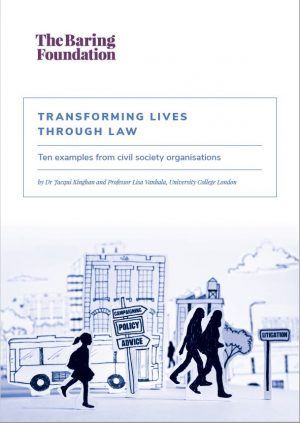This is one of 10 articles in our publication Transforming Lives through Law which looked at how civil society organisations in a wide range of sectors use legal tools and tactics to secure change.
When we think of free legal services in the UK, we tend to think of charities. However, now more than 70% of UK law schools offer free legal advice. Lawworks, a charity aimed at connecting volunteer lawyers to those who need legal advice, estimates that some 41% of legal advice clinics in the UK are now based in law schools. Often universities work together with charities, NGOs, law firms or community based organisations to create changes to the law.
More than 70% of UK law schools offer free legal advice
A successful example of this kind of collaboration happened in 2015, when the charity Just for Kids Law partnered with the Centre for Access to Justice at University College London (UCL) to fight against discrimination towards migrants in accessing student loans. The case is a useful example of the way in which the legal knowledge, expertise and enthusiasm of law students can be used to support charities involved in public interest litigation.
The case concerned a young woman who had come to the UK lawfully as a small child with her family. She was granted discretionary leave to remain and completed her primary and secondary education in the UK. As a student she achieved excellent academic grades and was Head Girl of her secondary school. However, she was unable to take up a university place – despite receiving numerous offers – because she was not entitled to student loan funding in light of her discretionary status.
A legal challenge of the application of the criteria went all the way to the Supreme Court where Just for Kids Law supported her by way of a third party intervention. It was argued that the criteria breached the right to education and also unjustifiably discriminated on the grounds of immigration status. Just for Kids wanted to gather and present evidence not only to help this particular individual but also to highlight to the court the impact of the restrictive student loan funding rules on the migrant community more widely. Gathering such evidence can be time and resource intensive and is also challenging in light of the tight timescales of many court cases. Rachel Knowles, the senior solicitor working on the intervention comments, “we didn’t get permission to intervene until about two seconds before the case… we were all proceeding on the assumption we would get permission.”
This is when law students were able to offer invaluable help. Closely supervised by Rachel, students at UCL gathered evidence for the intervention as part of an experiential Access to Justice course in their final year of undergraduate legal study. Students helped to conduct initial research, reached out to potentially affected young people, conducted interviews and collated case study evidence. Rachel felt that it was important to show the full range of those impacted by the restrictive student loan policy, so they had to reach far and wide across the networks of the newly established “Let us Learn” (now We Belong) campaign group, set up by a group of young migrants to campaign for access to education. As Rachel notes, “this wasn’t just about the kids with straight A*s going to Oxbridge, but about those wanting to study a diverse range of courses at different universities, which has a huge adverse impact upon their lives when that option is taken away.”
The partnership between UCL and Just for Kids demonstrates how students are often excellent motivators of their peers and can harness the power of fellow students in raising awareness of certain campaigns and issues. UCL students were paired with other students on the “Let us Learn” campaign and helped them with writing letters to MPs and navigating higher education policies and procedures. Such support can be useful to charities and campaigners, especially where student networks such as Young Legal Aid Lawyers or RebLaw UK can be drawn upon to help raise pro bono support and wider awareness in the long-term.
The case was a success: the Supreme Court found that the blanket exclusion from eligibility for student loans was discriminatory. With help from UCL students, Just for Kids had submitted 26 case studies as evidence of the impact and scale of the problem on migrant young people across the UK. In an evaluation of Just for Kids’ role in the case, interviewees identified the importance of the evidence gathered – the very job that the UCL students had focused on – not only for the intervention in the case itself but also as part of the wider campaign.
Sometimes we just have to be responsive and think differently about the ways in which we can use law students to support charities and NGOs in their work.
As Rachel notes, “sometimes we just have to be responsive and think differently about the ways in which we can use students to support charities and NGOs in their work.” The case shows how collaboration can help charities to get through work that may otherwise prohibit them from making a case. By thinking beyond the scope of its own organisation, Just for Kids was able to win not only in the short term but also in shaping the next generation of lawyers.
You can read an evaluation of Just for Kids Law’s intervention in the Supreme Court case here.
LawWorks runs a network for free advice clinics, including universities, in England and Wales here.
There is a Scottish University Law Clinic Network – more information here.
